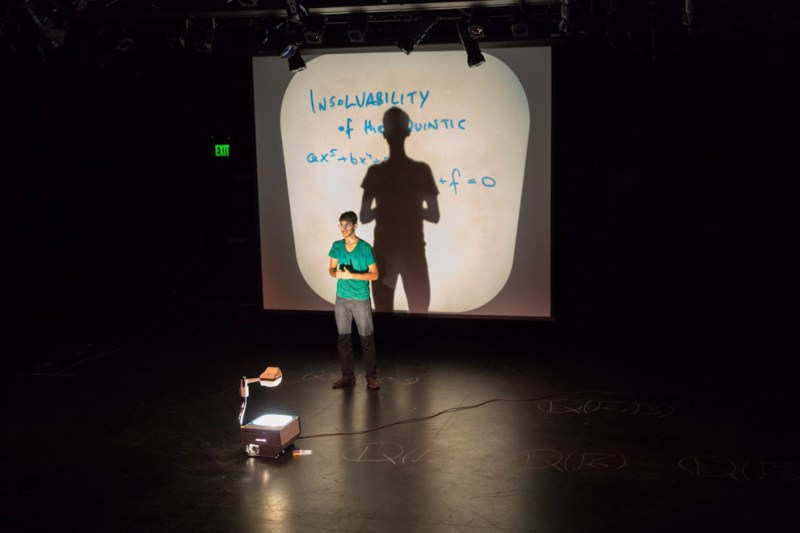For those of us who are not engineering or mathematics majors, when the first four words of a theatrical synopsis are, “A play about math,” we are skeptical of, if not horrified by, what is in store. This general aversion to math is noted, however, within the first few minutes of TAPS second-year Ph.D.’s Alex Johnson’s “The Duel,” as one of the actors desperately appeals to the audience: “Mathematicians are humans, too!” While the technical workings of theorems are present throughout the program, the genius of “The Duel” is its focus on the interconnection of human beings and methods of storytelling.
For a play about the life and times of Evariste Galois, a 19th-century savant, Johnson’s production is wildly unconventional. What initially seems like an unrehearsed curtain speech, consisting of an apology for the lack of programs and an indication of the Nitery Theater’s two exits, quickly becomes a debate between actors about the telling of Galois’ life. In contrast to the traditional biography, the six actors keep their real names and play themselves throughout. While the numbers-focused Vineet (Vineet Gupta ‘18) wants to focus on Galois’ theories, the more historically-minded Felix (Felix Abidor ‘15) demands that they let the sociopolitical climate of Galois’ life take center stage. Another character (Ezra Jackson-Smith ‘18) disregards all of these approaches and says that they must, above all else, demonstrate who Galois was as a person.
While perhaps inspired by the unconventional subject matter of mathematics, “The Duel” is not only a story about a French math prodigy but also a creative musing on what it means to narrate a tale and, further, to create theater. At various times throughout the play, sound effects go off and the stage manager yells an apology from offstage. Elias Mooring ’18, who delivers the curtain speech, breaks character midway through the play and yells that he forgot to tell people to turn off their cell phones and that it would be a great time to do so.
The most refreshing aspect of “The Duel” is that it never takes itself too seriously. When a scene errs on the side of being overly dramatic, the characters look into the distance and say things like “There was supposed to be a fog machine,” or “This was where the tap dance went” — lines met with roars of laughter. Written brilliantly, Johnson ensures that “The Duel” is relatable while avoiding clichés.
While there are numerous witticisms, in one scene describing Galois’ prison cell as a mix between Slytherin’s dungeon common room and a frat party, the play is also incredibly thoughtful. When one character goes on an extended meditation about the stars, he ends by smiling and asking, “What do you do to fall asleep?” While this diminishes the significance of what has just been said, we’re left thinking about what it means to be human and to ponder.
In the play’s final moments, six audience members are taken onstage and sit connected under the stars. The house goes dark and then the lights slowly come on. There is no applause, no final signifier of the play’s end. One moment there are actors, and the next moment there are none. What is left is a room of people sitting together, connected by theater.
Contact Olivia Witting at owitting ‘at’ stanford.edu.
This article has been updated to reflect students’ current identities.
